Authors

Maxine Berntsen
Faculty
Maxine Berntsen first came to India in 1966, and spent two years teaching at Vivek Vardhini College in Hyderabad, staying at the home of Dr. S.D. Satwalekar, principal of the college. While in Hyderabad she also started studying Telugu and Marathi. In 1963 she returned to the U.S. to do course work for a Ph.D. in linguistics, and in 1966 she returned to India to do the field work for her dissertation on sociolinguistic variation in the speech of Phaltan, a taluka town in Western Maharashtra. Along with competing her thesis, she also collaborated with Jai Nimbkar in developing a set of ten books to teach Marathi to adult non-Maharashtrians. From 1970 to 1999 she went to the U.S. every other year to teach Marathi to students from the Associated Colleges of the Midwest who were preparing to spend a year in Pune. In 1978 she renounced her American citizenship and became an Indian citizen. That same year she started working with out-of-school children, and in 1984 founded the Pragat Shikshan Sanstha (PSS). The PSS had three components: Apli Shala, a support programme for Dalit children; Kamala Nimbkar Balbhavan a full-time Marathi medium school; and an Outreach Programme, which later became the Centre for Language, Literacy and Communication.
When the TISS M.A. in Elementary Education programme was being set up, Maxine and Jane Sahi developed the course in First Language Pedagogy, which they taught from its inception until last year. In 2012 she was invited to join the new TISS campus at Hyderabad as a Professor Emerita. At present she is teaching one course in TISS, and heading an ELI project to adapt for Telugu the reading approach she had originally developed for Marathi.
She has received many awards for her work, the most recent being the Marathi Abhyasak Puraskar, an award from the Maharashtra government for her work in Marathi. A sketch of her life and work was also included in the volume, Daughters of Maharashtra. For her 80th birthday in 2015, Sujata Noronha and Jane Sahi brought out Threading Texts within Contexts – a selection of her poetry and her writings on language and education.

Harshita Das
Project Coordinator
Harshita Das engages as a Project Coordinator with the Early Literacy Initiative. She has an MA in Education from Azim Premji University, Bangalore. She has worked as a teacher at an alternative school in Bangalore, and has worked with pre-primary and primary teachers in a low income private school, where she supported them with the teaching and learning of English language. She has also volunteered at an NGO that works with children from the migrant labour community, where she co-taught Kannada and English and has actively participated in the setting up and functioning of a library in the government school that hosts the NGO.
Her key areas of interest are Critical Literacy, Language and Culture with an emphasis on the idea of Balanced Bilingualism. She has a high degree of fondness for children’s literature and the idea of engaging young children with the same. When she’s not going crazy collecting children’s literature you could find her happily getting her hands dirty with clay and paint. She finds a deep connect to birds in the wilderness and the stars in the vast sky.
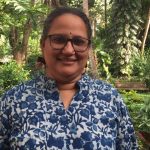
Sujata Noronha
Ph.D. Scholar, TISS Hyderabad
Sujata Noronha lives in Goa. She works with texts, children and educators through her library based organization, Bookworm. She has an M Phil in Education from TISS Hyderabad and is pursuing a PhD with a fair degree of determination and spirit. Sujata’s interest resides in the social imagination of literacy and the ways in which communities respond to texts. She is very drawn to supporting and strengthening literacy teaching and believes most thoroughly in a praxis of practice. This finds her engaged with equal fervour in directly working with communities of children and or educators and reading and writing.
At ELI, Sujata will conduct a part of the Sociohistorical study where she will help examine the history of language and literacy during the colonial era in Portuguese Goa.
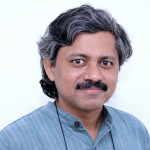
A. Giridhar Rao
A. Giridhar Rao is with Azim Premji University where he teaches courses on multilingual education, language policy, Esperanto and linguistic democracy, and science fiction. Earlier, in Hyderabad, he taught similar courses at International Institute of Information Technology. Before that he was editor and public awareness officer at the crops research institute ICRISAT.
His doctoral work on science fiction led him to learn the language Esperanto. He is a member of the Academy of Esperanto, and active in the local and worldwide movements. Giridhar’s blog in English on language and education, Bolii, is at http://bolii.blogspot.com. His Esperanto blog on the same themes is at http://www.ipernity.com/blog/giridhar.
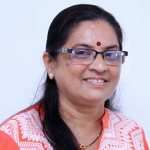
Nivedita Bedadur
Nivedita Bedadur is a member of the School of Distance Learning and University Resource Centre at Azim Premji University. She has an M.Phil. in American Drama from Pune University along with a B.Ed. from SNDT University. Previously, she has engaged with Kendriya Vidyalaya as an English Teacher since 1982, and has also been a part of their Teacher Training.

Saktibrata Sen
Saktibrata Sen is the Literacy Director at Room to Read. Room to Read works works across multiple countries with a keen focus on literacy and gender equality in education

Partha Sarathi Misra
Prof. Partha Sarathi Misra is a Faculty at Azim Prenji University. He teaches Curricular Material Development in Language and English Language Proficiency courses at the University and is involved in designing courses for the professional development of teacher educators. Besides an MA in English from the University of Nottingham, United Kingdom, he has a Ph.D in Linguistics from the University of Calcutta and a Postgraduate Diploma in Teaching English from the English and Foreign Languages University, Hyderabad. He has been working in the field of language, language teaching and teacher education for more than three decades. His areas of interest are stylistics, English language teaching, material production and textbook writing. Dr. Misra writes regularly on language and language teaching in his blog http://indiaelt.wordpress.com. His book An Introduction to Stylistics: Theory and Practice was published by Orient Black Swan, New Delhi.
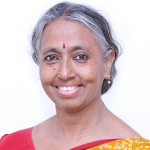
Devaki Lakshminarayan
Devaki is currently a faculty at Azim Premji University. She holds a Ph.D. in Psycholinguistics from the University of Mysore (1987) and has completed her post graduation in Psychology from Bangalore University. She also holds a Masters in Clinical Linguistics from the University of Groningen, The Netherlands. Prior to this, she had been with the Central Institute of Indian Languages, Mysore. Her areas of interests are language learning, bilingualism and bilingual education and relation between language and cognition.
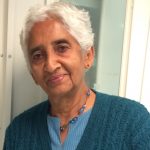
Usha Mukunda
Usha Mukunda has happily interacted with books and children for over 30 years now. As a school and children’s librarian, she has learnt much from these interactions and is always looking and listening to refresh her ideas about reading, books and libraries.As a consultant for the Parag Initiative of Tata Trusts, she has been part of the faculty of three online courses for library educators held at Udaipur, Sirohi and Goa.She has authored a manual for running a school library, as well as articles on library matters and reading activities. She also enjoys reading and writing reviews of children’s books.Usha Mukunda is deeply interested in exploring and sharing the nuances of good literature for children. She is also passionate about bringing about discernment about books in readers wherever they may abide.

Jane Sahi
Jane Sahi has been working in the area of education for the last 38 years. She was born in England and moved to India in 1968 in search of a deeper understanding of Gandhiji’s life and values. Gandhiji continues to be to a strong source of inspiration for her, in particular, his vision and theory of basic education. In 2000 she wrote a book entitled ‘Education and Peace’.
She also set up an alternate school in 1975, called Sita School, where the focus was on holistic, child centric education for every child. The school had an emphasis on learning through art and to Jane, her engagement at the school formed the basis of her work.
Jane has conducted a number of workshops on language teaching for the Centre for Learning, Bangalore, Teacher Foundation, Regional Institute of English, Bangalore, PSS, Phaltan and Kiran Centre, Varanasi and Ashram Shala Schools in Chamrajnagar. She has been actively involved in the Alternative School Network, an informal group of individuals working in the field of education, for almost two decades now.
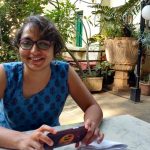
Maitri Vasudev
Maitri teaches English at the School of Liberal Studies, Azim Premji University, Bangalore. Her interest in children’s literature was sparked by a course she completed in her Masters programme at St Joseph’s College, Bangalore. This course, titled Children’s Literature and its Discontents, explored the idea that the adult, in creating, moderating and censoring reading material for the child, constantly attempts to create a smaller, inferior version of him/herself. It led Maitri to her dissertation on the childhood(s) Philip Pullman creates in His Dark Materials trilogy.
Her interest expanded when she had the opportunity to work with Shailaja Menon on Kathavana, APU’s children’s literature festival, in 2017. This time, she could look at children’s books from the practitioners’ perspective as opposed to the theoretical one she had previously been exposed to. This experience also introduced her to the attempts authors, illustrators and publishers are making in the Indian context to de-moralise and reevaluate contemporary value systems.
Maitri is currently studying illustrations in Indian children’s books with Shailaja Menon.
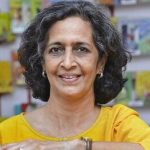
Mini Shrinivasan
Mini Shrinivasan is a teacher educator and children’s author. Her books for pre-teens have won the Sahitya Akademi’s Bal Sahitya Puraskar and the Hindu Young World Goodbooks award for Best Children’s Fiction. She lives in Pune and works as an advisor to projects working in education in the most backward districts of the country. She writes in English and Marathi.

Divi Singh

Sonali Nag
Sonali Nag is Associate Professor of Education and the Developing Child and Fellow of Brasenose College, University of Oxford. She has an MPHIL from NIMHANS, India, and is associated with The Promise Foundation headquartered in Bangalore.
Following her MPhil Sonali co-established the Consultant Psychologists Group and a Special Needs Center offering assessment, counselling and remedial support for children manifesting difficulties in school. She also began work in the Indian charity, The Promise Foundation, focusing on early childhood and primary school programmes for children in poverty where she remains an Honorary member. For her PhD she examined the impact of two interventions on literacy outcomes among multilingual children. In 2004, she began exploring the cognitive bases of learning to read in the Indic writing system of South Asia and as a Newton Fellow of the Royal Society and British Academy began the Children Learning to Read project in India in 2009. She curates a unique web resource—Lingua Akshara—for researchers, clinicians and teachers working in South and Southeast Asian languages. More recently, she has focused on a rigorous review of the developing countries literature on language and literacy learning, cultural sensitivity of early grades programmes and the abiding influence of home environments and classroom practices (2013-2016). She moved to Oxford in 2017.
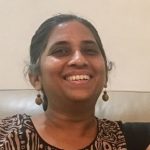
Neela Apte
Neela Apte has her MSW from Karnatak University, Dharwad, and her B. Ed. from Mumbai University. Neela has been working in the field of quality education since the last 20 years. She received ‘Dr. Devdatta Dabholkar Fellowship’ for studying and understanding the role of School Management Committees in improving the quality of education in government schools. She has published various articles on education, parenting and other social issues in Marathi periodicals. She has worked as Research Associate in the Literacy Research in Indian Languages (LiRIL) project from 2011-2017.

Sajitha S
Sajitha co-founded an NGO named, SAJAG and is working with children and young adults on the issues related to education.
She has been working with the Longitudinal research project Literacy Research in Indian Languages (LiRIL) for the past four years. She contributed on understanding the issue of teaching and learning of early reading and writing of Marathi (of Maharashtra) by conducting classroom observations and interacting with children. Prior to that she has been working with QUEST, a reputed organization of Maharashtra as Project Head of their flagship Project ‘Balbhavan’. Balbhavans are school-supplementary learning centres attached to the public schools. Children from grade 1 to 4 are given quality inputs in Language and Math. Sajitha also worked with women in helping form their Self Help Groups and running it for one and half years at Samaj Pragati Sahayog, Madhya Pradesh before working in the field of education.
Academic Qualifications: –
- M.A in Social Work ( Tata Institute of Social Sciences)
- Bachelors in Economics (Mumbai University)

Keerti Jayaram
Keerti Jayaram is currently the Director of the Organisation for Early Literacy Promotion or OELP. OELP aims to build strong foundations in Early Literacy and Learning (ELL) for young learners from diverse socio-cultural and linguistic contexts which include children from low literate communities in rural Rajasthan. The outreach of this work extends to seven district in Rajasthan and a few other States of India. Keerti has represented OELP on various national and international platforms such as Advisory Body for Early Literacy of the MHRD, Reading Cell at NCERT and UNESCO Asia Summit.
Previously, she has taught Pedagogy of Language courses on the B. El. Ed Programme in Lady Shri Ram College, New Delhi, from 2002 to 2006. Her professional experience includes intensive engagement through Individual Education Plans (IEPs) for children with special learning needs from the American International School in New Delhi from 1999 to 2005. She also worked as Coordinator of the Ramjas Teacher’s Centre for nine years. This was period when she was able to actively explore innovative classroom pedagogies such process writing; writers’ workshops; literature circles; cooperative learning; circle time and learner centered approaches to Science, EVS and Maths along with innovative approaches to assessments within each of these domains. Keerti has had more than 30 years of experience in Elementary Education as a teacher, teacher educator, curriculum developer, researcher and parent, and has interacted actively with the academic world as well as with the multiple worlds of education practitioners. She has several publications to her credit.

Nilesh Nimkar
Nilesh Nimkar is the Director and Trustee at Quality Education Support Trust (QUEST). He is an educationist working for last 15 years in tribal belts of Thane district and currently at Palghar district as an educator and as a teacher educator at State and National level. He is also a training consultant to DPEP (District Primary Education Programme, Government of Maharashtra) and consultant to UNICEF and Sir Ratan Tata Trust.

Shobha Sinha
Dr. Shobha Sinha is an Associate Professor at the Central Institute of Education, University of Delhi. Dr. Sinha completed her PhD in language and literacy from the University of Illinois at Urbana-Champaign. Her areas of specialization are literacy in the school context, literacy development of children from marginalized groups and minimal literacy backgrounds, response to literature and emergent Literacy. She has taught courses in language and literacy, language pedagogy, language across the curriculum and research methods.
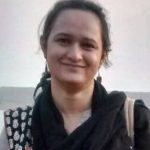
Shivani Nag
Dr. Shivani Nag is a faculty in School of Education Studies, Ambedkar University Delhi. She works in the area of cultural psychology and critical pedagogy. She is currently working on exploring the experiences of women in higher education in relation to how institutional norms impact their participation in communities of practice. She has done her M.Phil. and Ph.D. from Jawaharlal Nehru University and her research focuses on socio-cultural ‘inclusion’ of the marginalised in education. Her doctoral thesis examined the theories and practices of multilingual education in India to explore their role in enabling inclusion of children’s socio-cultural context. She has worked with National Multilingual Education Resource Consortium (NMRC) as part of the project’s documentation and research team.

Manjiri Nimbkar
Dr. Manjiri Nimbkar acquired an MBBS in 1981 and ran her own private practice as a general practitioner in an economically disadvantaged area of Phaltan town. She founded a school for children with special needs in 1985 and ran it for four years.
In 1995, she started working in the Kamala Nimbkar Balbhavan (KNB) of Pragat Shikshan Sanstha in Phaltan, founded by Dr. Maxine Berntsen. KNB is an innovative Marathi medium school with classes from kindergarten to tenth. She became the Principal of KNB in 2000 and a Director and treasurer of Pragat Shikshan Sanstha in 2002. She received the Barrister P.G. Patil Memorial award from the Satara District Secondary School Retired Principal’s Association for ideal Principal in 2006.
She obtained an MA in Elementary Education (winning the gold medal) from the Tata Institute of Social Sciences in 2008. She has written many articles in magazines and newspapers in Marathi and English on education. In 2010 she wrote a book called Mulanche Srujanatmak Likhan (Children’s Creative Writing) based on the writing of students in KNB.

Shubhra Chatterji
Mrs. Shubhra Chatterji has been working in the space of school education since 1986. She has worked as a teacher, curriculum developer, pre-school incubation expert, teacher educator and designer of teacher preparation programmes. She has worked in a variety of socio-economic settings, and is founder Director of Vikramshila, a resource organization that works across the country on issues of educational quality and equity. This organization began its journey by providing teacher support to rural NGO run pre-schools – it has evolved alongside the children it serves, and now works across the K-10 spectrum across 10 states of India. Most recently Mrs. Chatterji has provided technical expertise in rewriting the ECE curriculum for the ICDS system in West Bengal and Jammu and Kashmir. One of her abiding areas of interest is ‘Language Learning in Early Years’. She is an avid reader of books and enjoys watching good movies.
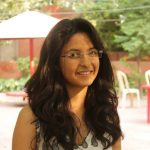
Diksha Kharbanda
Diksha Kharbanda is working as a Research Assistant with the Early Literacy Initiative Project, since 2017 after completing her M.A. in Education from Tata Institute of Social Sciences, Hyderabad. During her internships she worked on developing English curriculum for young children, planning and conducting the sessions. These experiences made her think more deeply and critically about language pedagogy. She hasa keen interest in observing and understanding young children, how they learn languages especially at the early stages in the school context and developing low cost and efficient teaching learning material.
Diksha loves to read books. She cannot stop herself from reading children’s literature and believes that these stories that seem so simple and beautiful often have a very deep meaning to it. During her free time, she tries her hand at drawing and painting. Other than this, she likes to watch movies of varied genres, collect stationary of different kinds and hot wheels cars. She wants to retain the child in her forever.
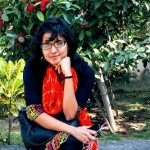
Shuchi Sinha
Communications Consultant
Shuchi Sinha is an alumna of Azim Premji University, Bangalore and has been working as a Communications Coordinator with the ELI Communications team. Alongside she is also a teacher at Adharshila Learning Centre, a school for tribal children in rural Madhya Pradesh. Before ELI and Adharshila she worked as an Academic Coordinator at OELP, an organization dedicated to meaningful literacy ideas and practices.
Amongst many things that interest her, she finds her heart almost always coming back to settle at the idea and possibilities of Critical Literacy. She truly believes language holds emancipatory possibilities and that each child, irrespective of her/his context, must be given an environment to develop a sense of love and fearlessness of words .